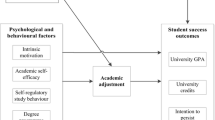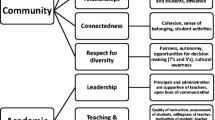Abstract
Postsecondary institutions seek to create a pedagogical environment that increases students' knowledge, expands their powers of reasoning, and shapes their psychosocial dispositions. In this study, we examined a conceptual model of academic attainment including two aspects of the pedagogical environment experienced by students, namely the cognitive demands set by professors and the social support provided by both professors and other students. Along with these climate variables, three psychosocial dispositions of students, self-esteem, perceived academic control, and coping strategies, were also included. A sample of 854 undergraduate students in the faculties of Arts and Science from a mid-western Research-1 (Canadian) university was used to estimate the effect parameters in the model. The results suggest that both cognitive demands and social support affected the students 9 perceived academic control and coping strategies. In turn, the pedagogical environment and the psychosocial dispositions affected the students' academic achievement. Implications for establishing and maintaining supportive pedagogical environments and for helping students improve their perceived control and coping strategies are discussed.
Similar content being viewed by others
REFERENCES
Ashenfelter, O., and Krueger, A. (1994). Estimates of the economic returns to schooling from a new sample of twins. American Economic Review 84: 1157–1173.
Astin, A. W. (1975). Preventing Students from Dropping Out. Jossey-Bass, San Francisco, CA.
Astin, A. W. (1985). Achieving Educational Excellence: A Critical Assessment of Priorities and Practices in Higher Education. Jossey-Bass, San Francisco, CA.
Astin, A. W. (1993). What Matters in College? Four Critical Years Revised. Jossey-Bass, San Francisco, CA.
Bandura, A. (1997). Self-efficacy: The Exercise of Control. Freeman, New York.
Becker Gary, S. (1975). Human Capital: A Theoretical and Empirical Analysis, with Special Reference to Education. University of Chicago Press, Chicago, IL.
Bidwell, C. E. (1989). The meaning of educational attainment. Research in the Sociology of Education and Socialization 8: 117–138.
Bloom, B. S., Engelhart, M. D., Furst, E. J., Hill, W. H., and Krathwohl, D. R. (1956). Taxonomy of Educational Objective: Cognitive Domain. David Mackay, New York.
Clifton, R. A. (1997). The effects of social psychological variables and gender on the grade point averages and educational expectations of university students: A case study. The Canadian Journal of Higher Education 27: 67–90.
Clifton, R. A., Etcheverry, E., Hasinoff, S., and Roberts, L. W. (1996). Measuring the cognitive domain of the quality of life of university students. Social Indicators Research 38: 29–52.
Clifton, R. A., and Roberts, L. W. (1993). Authority in Classrooms. Prentice Hall Canada, Scarborough, ON.
Conley, D. (2001). Capital for college: Parental assets and postsecondary schooling. Sociology of Education 74: 59–72.
Covington, M. (1992). Making the Grade: A Self Worth Perspective on Motivation and School Reform. Cambridge University Press, New York.
Covington, M. V. (2000). Goal theory, motivation, and school achievement: An integrative review. Annual Review of Psychology 51: 171–200.
Craparo, J. S., Hines, R. P., and Kayson, W. A. (1981). Effects of experienced success or failure on self-esteem and problem-solving ability. Psychological Reports 49: 295–300.
Cuseo, J. B. (1991). The freshman orientation seminar: A research-based rationale for its value, delivery and content [Monograph]. The Freshman Year Experience 4: 1–3.
Etcheverry, E., Clifton, R. A., and Roberts, L. W. (2001). Social capital and educational attainment: A study of undergraduates in a Faculty of Education. The Alberta Journal of Educational Research 47: 24–39.
Fiske, S. T., and Taylor, S. E. (1991). Social Cognition (2nd Ed.), McGraw-Hill, New York.
Frucot, V. G., and Cook, G. L. (1994). Further research on the accuracy of students' self-reported grade point averages, SAT scores, and course grades. Perceptual and Motor Skills 79: 743–746.
Goldman, B. A., Flake, W. L., and Matheson, M. B. (1990). Accuracy of college students' perceptions of their SAT scores, high school and college grade point averages relative to their ability. Perceptual and Motor Skills 70: 514.
Gottfried, A. E., Fleming, J. S., and Gottfried, A. W. (2001). Continuity of academic intrinsic motivation from childhood through late adolescence: A longitudinal study. Journal of Educational Psychology 93: 3–13.
Hativa, N., and Marincovich, M. (eds.) (1995). Disciplinary Differences in Teaching and Learning in Higher Education. Jossey-Bass, San Francisco, CA.
Hersey, P., and Blanchard, K. H. (1993). Management of Organizational Behavior: Utilizing Human Resources (6th Ed.). Prentice Hall, Englewood Cliffs, NJ.
Kerckhoff, A. C. (2001). Education and social stratification processes in comparative perspective. Sociology of Education, Extra Issue 3(18): 3–18.
Krymkowski, D. H. (1991). The process of status attainment among men in Poland, the U.S., and West Germany. American Sociological Review 56: 46–59.
Kuh, G. D. (1995). The other curriculum: Out-of-class experiences associated with student learning and personal development. Journal of Higher Education 66: 123–155.
Lewington, J. (1996 November 14). Falling through the cracks. The Globe and Mail pp. C1–C2.
Liu, X., Kaplan, H. B., and Risser, W. (1992). Decomposing the reciprocal relationship between academic achievement and general self-esteem. Youth and Society 24: 123–148.
Menec, V. H., and Perry, R. P. (1995). Disciplinary differences in perceptions of success: Modifying misperceptions with attributional retraining. New Directions for Teaching and Learning 64: 105–112.
Menec, V. H., Perry, R. P., Struthers, C. W., Schonwetter, D. J., Hechter, F. J., and Eichholz, B. L. (1994). Assisting at-risk college students with attributional retraining and effective teaching. Journal of Applied Social Psychology 24: 675–701.
Mirowsky, J., and Ross, C. E. (1998). Education, personal control, lifestyle and health: A human capital hypotheses. Research on Aging 20: 415–449.
Neter, J., Kutner, N. H., Nachtsheim, C. J., and Wasserman, W. (1996). Applied Linear Regression Models (3rd Ed.). Irwin, Chicago, IL.
Noel, L. (1985). Increasing student retention: New challenges and potential. In: Delworth U., and Hanson G. R. (eds.), Increasing Student Retention, Jossey-Bass, San Francisco, CA, pp. 1–27.
Pascarella, E. T., Edison, M., Hagedorn, L. S., Nora, A., and Terenzini, P. T. (1996). Influences on students' internal locus of attribution for academic success in the first year of college. Research in Higher Education 37: 731–755.
Pascarella, E. T., and Terenzini, P. T. (1991). How College Affects Students: Findings and Insights from Twenty Years of Research. Jossey-Bass, San Francisco, CA.
Perry, R. P. (1991). Perceived control in college students: Implications for instruction in higher education. In Smart, J. (ed.), Higher Education: Handbook of Theory and Research, (Vol. 7), Agathon, New York, NY. pp. 1–56.
Perry, R. P., Hladkyj, S., Pekrun, R. H., and Pelletier, S. T. (2001). Academic control and action control in the achievement of college students: A longitudinal field study. Journal of Educational Psychology 93: 776–789.
Perry, R. P., and Magnusson, J.-L. (1987). Effective instruction and students' perceptions of control in the college classroom: Multiple-lectures effects. Journal of Educational Psychology 79: 453–460.
Perry, R. P., and Magnusson, J.-L. (1989). Causal attribution and perceived performance: Consequences for college students' achievement and control in different instructional conditions. Journal of Educational Psychology 81: 164–172.
Perry, R. P., and Penner, K. S. (1990). Enhancing academic achievement in college students through attributional retraining and instruction. Journal of Educational Psychology 82: 262–271.
Perry, R. P., and Tunna, K. (1988). Perceived control, type A/B behavior, and quality of instruction. Journal of Educational Psychology 80: 102–110.
Phelan, W. (1979). Undergraduate orientations towards scientific and scholarly careers. American Educational Research Journal 16: 411–422.
Roberts, L. W., and Clifton, R. A. (1992). Measuring the affective quality of life of university students: The validation of an instrument. Social Indicators Research 27: 113–137.
Robson Crump, B. R., Hickson, J. H., and Laman, A. (1985). Relationship of locus of control to achievement and self-concept in education majors. Psychological Reports 57: 1055–1060.
Rosenberg, M. (1989). Society and the Adolescent Self-image. Wesleyan University Press, Middletown, CT.
Ross, C. E., and Broh, B. A. (2000). The roles of self-esteem and the sense of personal control in the academic achievement process. Sociology of Education 73: 270–284.
Schonwetter, D. J., Perry, R. P., and Struthers, C. W. (1993). Students' perceptions of control and success in the college classroom: Affects and achievement in different instruction conditions. Journal of Experimental Education 61: 227–246.
Schultz, T. W. (1961). Investment in human capital. American Economic Review 51: 1–17.
Sigmon, S. T., Stanton, A. L., and Snyder, C. R. (1995). Gender differences in coping: A further test of socialization and role constraint theories. Sex Roles 33: 565–587.
Stipek, D. J., and Weisz, J. R. (1981). Perceived control and academic achievement. Review of Educational Research 51: 101–138.
Struthers, C. W., Perry, R. P., and Menec, V. H. (2000). An examination of the relationship among academic stress, coping, motivation, and performance in college. Research in Higher Education 41: 581–592.
Szafran, R. F. (2001). The effect of academic load on success for new college students: Is lighter better? Research in Higher Education 42: 27–51.
Tabachnick, B. G., and Fidell, L. S. (2001). Using Multivariate Statistics (4th Ed.). Allyn and Bacon, Boston, MA.
Ting, S-M. R., and Robinson, T. L. (1998). Measuring cognitive and psychosocial variables for Caucasian and African American students. Journal of College Student Development 39: 599–610.
Tinto, V. (1985). Dropping out and other forms of withdrawal from college. In Delworth, U., and Hanson, G. R. (eds.), Increasing Student Retention. Jossey-Bass, San Francisco, CA, pp. 28–43.
Weidman, J. C. (1989). Undergraduate socialization: A conceptual approach. In Smart J. C. (ed.), Higher Education: Handbook of Theory and Research (Vol. 5). Agathon Press, New York, pp. 289–322.
Weiner, B. (1986). An Attributional Theory of Motivation and Emotion. Springer-Verlag, New York.
Weiner, B. (1995). Judgements of Responsibility: A Foundation for a Theory of Social Conduct. Guildford Press, New York.
Wentzel, K., and Wigfield, A. (1998). Academic and social motivational influences on students' academic performance. Educational Psychology Review 10: 155–175.
Wheaton, B. (1980). The sociogenesis of psychological disorder: An attributional theory. Journal of Health and Social Behavior 21: 100–124.
Zimmerman, M. A., Caldwell, C. H., and Bernat, D. H. (2002). Discrepancy between self-reported and school-reported grade point average: Correlates with psychosocial outcomes among African American adolescents. Journal of Applied Social Psychology 32: 86–109.
Author information
Authors and Affiliations
Rights and permissions
About this article
Cite this article
Clifton, R.A., Perry, R.P., Stubbs, C.A. et al. Faculty Environments, Psychosocial Dispositions, and the Academic Achievement of College Students. Research in Higher Education 45, 801–828 (2004). https://doi.org/10.1007/s11162-004-5950-2
Issue Date:
DOI: https://doi.org/10.1007/s11162-004-5950-2




